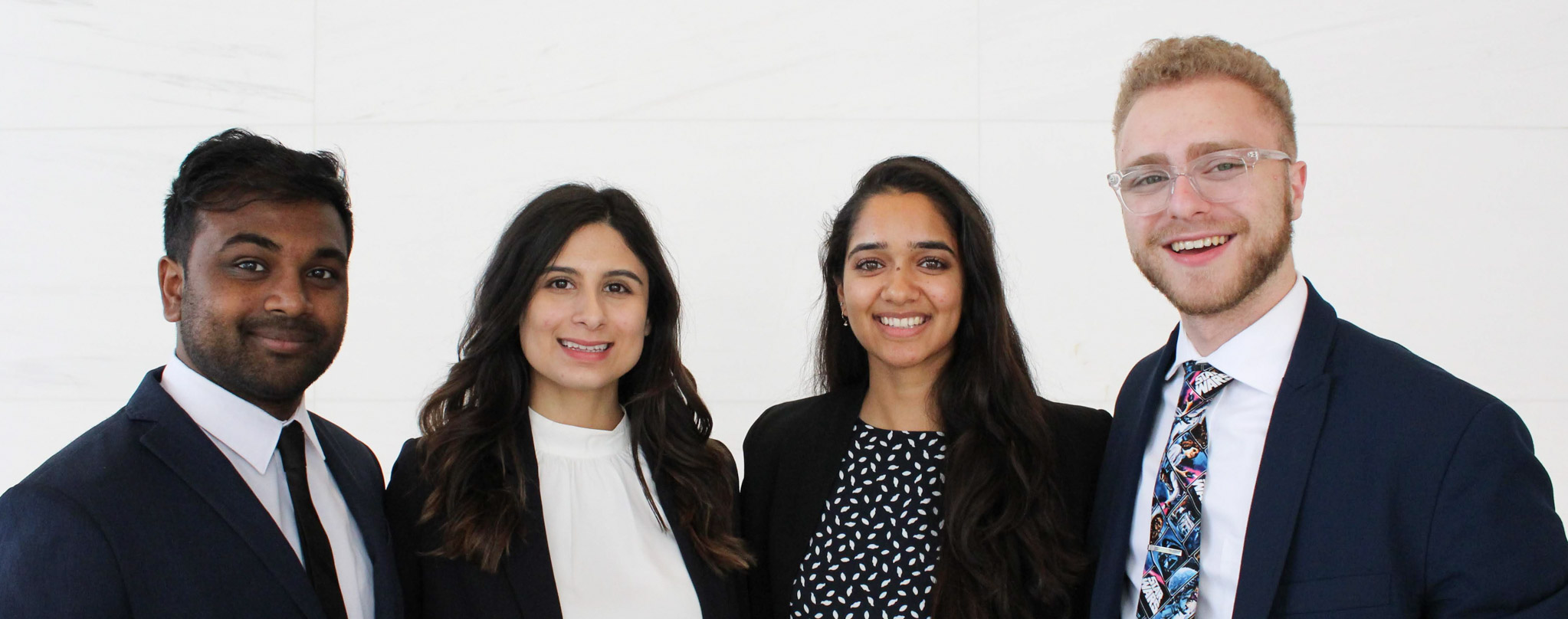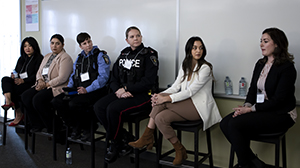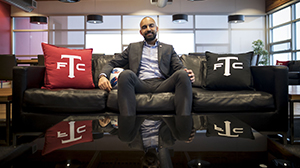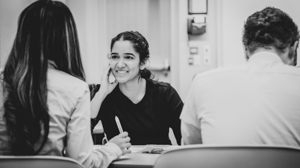- Future Students
- Current Students
- Faculty
- Staff
- Alumni
- Others
UofGH advances to semifinals at CFO Case Study Competition in South Africa

From left: Michael Persaud, Emma Lal, Shirin Monga, Daniel Bielak
For the second year in a row, a team of University of Guelph-Humber Business students and alumni have advanced to the semifinals at the prestigious CFO Case Study Competition, placing in the top six. The competition, which began on March 1, 2019, involves a highly competitive and rigorous process – with 1,950 students on 550 teams, from 85 universities, 46 countries, and six continents, competing this year.
The UofGH team – which includes fourth-year Business students Shirin Monga and Daniel Bielak, and alumni Emma Lal and Michael Persaud – receive an all-expenses-paid trip to Johannesburg, South Africa to compete in the final rounds of the competition. The final rounds will take place on October 15 and 16, 2019 at the Johannesburg Stock Exchange – the oldest and largest stock exchange in Africa. In addition to UofGH, teams from Finland, UK, Germany, Nigeria, and South Africa made the top six.
In the first round, the UofGH team had to solve five business problems relating to Volkswagen, and submitted a report that they completed over a two-month period. Winning teams advanced to the top 20.
Those 20 teams then submitted PowerPoint slides and a 10-minute video presenting their case solutions. The teams also created one-minute videos introducing the team and stating why they should receive votes on social media.
In October, the six semi-finalists will present in front of a panel of judges that will include CEOs and CFOs of major public corporations. The three winning teams will go on to compete in the finals the following day, where a winner will be selected. The winner will have the opportunity to blow the Kudu Horn, which opens up trading at the Johannesburg Stock Exchange.
“This is a once-in-a-lifetime opportunity to present our team’s solutions to a panel of C-suite executives at the Johannesburg Stock Exchange,” says Monga, who is the team captain. “It’s a chance for us to showcase our diverse experiences and represent the University of Guelph-Humber on a global platform.” She says that in addition to competing globally, she’s looking forward to fulfilling another team goal. “After the competition, the team will achieve its common goal of going on an authentic African safari to see the Big 5 animals, especially giraffes.”
Persaud said he was out for dinner with a team member following social media, when they found out they had made the semi-finals. “Once we saw that the video was posted we immediately watched it and found we were the first team in the video announced, which was a lot of excitement.” Despite being excited to reach the semi-finals, Persaud says he’s focused on preparing for the competition in South Africa. “Making the semi-finals means to me that there’s still two more rounds to go until the competition is over. I’m just focused on getting through semi-finals now,” he says.
Monga says she is happy that the team’s hard work has paid off. “Making it to the semi-finals is a significant personal and professional accomplishment for me,” says Monga. “It means all those late nights, weekend meetings, hangout calls, and video shoots paid off. It is definitely a huge milestone in my undergraduate career, and it wouldn’t be possible without the dedication of my team, Daniel, Emma, Michael, and our coach, Justin Medak.”
“I’m so happy for our students making the semi-finals – they have worked tremendously hard all year, and the amount of effort we’ve put into training for various case competitions, these students deserve everything they’ve worked so hard for,” says Justin Medak, Assistant Program Head of Business at UofGH, who also trains UofGH students for case competitions at all levels. “It shows how far we’ve come as a university to make the top six in back-to-back years. It speaks to the quality of our students, the impact they have globally, and I’m very impressed with them.”
Real-world preparation
Medak says case competitions give students critical analysis and public speaking skills that will benefit them in the work world. “Students become very polished, with a solid business acumen, and they learn to be very to-the-point with the message they’re conveying,” says Medak.
In addition, the CFO Case Study Competition also allows students to network with their peers from around the world. “It’s an amazing opportunity to compete with the best universities in the world – it’s spectacular, and the students gain so much confidence from competing in this global environment,” says Medak.
Persaud says students learn many skills by competing in case competitions. “It’s taught me a lot of soft skills, such as thinking on my feet, being able to quickly analyze a case and look for the greater issue at hand. This has helped me both personally and professionally by being able to quickly find issues and proceed to initiating a solution,” he says.
As the team captain, Monga says she has learned many valuable skills she will take forward into the future, including working in a time-sensitive environment and stress-management. “I learned the importance of setting the appropriate team culture, to ensure our team works towards the common objective and helps each other get there,” she says. “My participation in case competitions also taught me to adapt my leadership style according to the individual I manage, which I apply in group projects, case teams, and the workplace.”
How you can help
All six semi-finalist teams will have their one-minute videos posted on the CFO’s Facebook page, where they can earn points for “likes” and “shares” – part of a 65-day social media challenge that takes place until September 15. The three teams receiving the most “likes” and “shares” will receive 5%, 3%, and 1% boosts in their semifinals scores, which could be an important advantage. UofGH students are encouraged to give the team a huge assist by clicking “share” and “like” on the University of Guelph-Humber’s submission!







